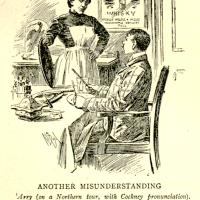
This is my first time reading Charles Dickens’ Bleak House. As it is featured in Gary Colledge’s God and Charles Dickens and Harold Bloom’s The Western Canon, I thought I should come at last to this very long book.
If you have ever been thrown by the sheer weight of the book, try to move past this intimidating feature. It is a beautifully written book, filled with some of the most hilarious and heartbreaking characters I have ever met.
The stunning pose that Milton’s Satan strikes upon the page has  made some wonder whether it is simply impossible to write a morally good character with as much colour and complexity as a bad one. Dickens has done it with his protagonists–and done so without bending the “bad” characters into moral gargoyles. Actually, the evil characters are mournful, self-ingrained figures, sorrysome to behold. Dickens’ supporting cast are like the characters in C.S. Lewis’ The Great Divorce. We see them face their own cruelty, sadness, ill luck, and self-delusion one after the other. The self-revelation is sometimes fatal, but not often enough.
made some wonder whether it is simply impossible to write a morally good character with as much colour and complexity as a bad one. Dickens has done it with his protagonists–and done so without bending the “bad” characters into moral gargoyles. Actually, the evil characters are mournful, self-ingrained figures, sorrysome to behold. Dickens’ supporting cast are like the characters in C.S. Lewis’ The Great Divorce. We see them face their own cruelty, sadness, ill luck, and self-delusion one after the other. The self-revelation is sometimes fatal, but not often enough.
Dickens does not use sophisticated language, yet his biting irony and iron-edged description, set in the context of dusky gloom and dim sitting rooms and low burning fireplaces, results in very beautiful writing. Of the most moving scenes, the various visits into the slums are the most effective for me.
 I don’t have the courage to replay for you some of the most pathetic shocking of these scenes, so I will play one of Tough Jo. he might be the beginning of a cultural change in the imagination of the downtrodden. This pour street urchin spends his life among
I don’t have the courage to replay for you some of the most pathetic shocking of these scenes, so I will play one of Tough Jo. he might be the beginning of a cultural change in the imagination of the downtrodden. This pour street urchin spends his life among
“the extraordinary specimens of human fungus that spring up spontaneously in the western streets of London.”
Here’s how we meet Jo, early in the story, as he is a witness in a court case and it needs to be determined whether he can give sufficient testimony:
Here he is, very muddy, very hoarse, very ragged. Now, boy! But stop a minute. Caution. This boy must be put through a few preliminary paces.
Name, Jo. Nothing else that he knows on. Don’t know that everybody has two names. Never heerd of sich a think. Don’t know that Jo is short for a longer name. Thinks it long enough for HIM. HE don’t find no fault with it. Spell it? No. HE can’t spell it. No father, no mother, no friends. Never been to school. What’s home? Knows a broom’s a broom, and knows it’s wicked to tell a lie. Don’t recollect who told him about the broom or about the lie, but knows both. Can’t exactly say what’ll be done to him arter he’s dead if he tells a lie to the gentlemen here, but believes it’ll be something wery bad to punish him, and serve him right—and so he’ll tell the truth
 Needless to say, the gentlemen of the chancery court don’t find him an eligible witness.
Needless to say, the gentlemen of the chancery court don’t find him an eligible witness.
Jo can’t tell us his full name or family or anythink about anythink, but his story haunts me. I’ll play a bit of it for you now, picking up where a preacher, Rev. Chadband, has tricked Jo into coming to hear a sermon. Midway through–and I’ll spare you playing the entire thing–Jo falls asleep standing. Despite his prime audience’s disinterest, Chadband takes advantage of the moment to preach to the room. He finds one convert, Mrs. Snagsby, whose jealousy haunts her morally limp hen-pecked husband, and whose servant (Guster) is prone to fits (seizures?).
Watch Jo’s interaction with Guster, but also note that the narrator takes a moment to make a rare religious judgment upon the scene. The warning about improving the gospel–about preachers standing in its light (and blocking what others can see)–is no less relevant today, I think.

“Or, my juvenile friends,” says Chadband, descending to the level of their comprehension with a very obtrusive demonstration in his greasily meek smile of coming a long way downstairs for the purpose, “if the master of this house was to go forth into the city and there see an eel, and was to come back, and was to call unto him the mistress of this house, and was to say, ‘Sarah, rejoice with me, for I have seen an elephant!’ would THAT be Terewth?”
Mrs. Snagsby in tears.
 “Or put it, my juvenile friends, that he saw an elephant, and returning said ‘Lo, the city is barren, I have seen but an eel,’ would THAT be Terewth?”
“Or put it, my juvenile friends, that he saw an elephant, and returning said ‘Lo, the city is barren, I have seen but an eel,’ would THAT be Terewth?”
Mrs. Snagsby sobbing loudly.
“Or put it, my juvenile friends,” said Chadband, stimulated by the sound, “that the unnatural parents of this slumbering heathen—for parents he had, my juvenile friends, beyond a doubt—after casting him forth to the wolves and the vultures, and the wild dogs and the young gazelles, and the serpents, went back to their dwellings and had their pipes, and their pots, and their flutings and their dancings, and their malt liquors, and their butcher’s meat and poultry, would THAT be Terewth?”
Mrs. Snagsby replies by delivering herself a prey to spasms, not an unresisting prey, but a crying and a tearing one, so that Cook’s Court re-echoes with her shrieks. Finally, becoming cataleptic, she has to be carried up the narrow staircase like a grand piano. After unspeakable suffering, productive of the utmost consternation, she is pronounced, by expresses from the bedroom, free from pain, though much exhausted, in which state of affairs Mr. Snagsby, trampled and crushed in the piano-forte removal, and extremely timid and feeble, ventures to come out from behind the door in the drawing-room.
 All this time Jo has been standing on the spot where he woke up, ever picking his cap and putting bits of fur in his mouth. He spits them out with a remorseful air, for he feels that it is in his nature to be an unimprovable reprobate and that it’s no good HIS trying to keep awake, for HE won’t never know nothink. Though it may be, Jo, that there is a history so interesting and affecting even to minds as near the brutes as thine, recording deeds done on this earth for common men, that if the Chadbands, removing their own persons from the light, would but show it thee in simple reverence, would but leave it unimproved, would but regard it as being eloquent enough without their modest aid—it might hold thee awake, and thou might learn from it yet!
All this time Jo has been standing on the spot where he woke up, ever picking his cap and putting bits of fur in his mouth. He spits them out with a remorseful air, for he feels that it is in his nature to be an unimprovable reprobate and that it’s no good HIS trying to keep awake, for HE won’t never know nothink. Though it may be, Jo, that there is a history so interesting and affecting even to minds as near the brutes as thine, recording deeds done on this earth for common men, that if the Chadbands, removing their own persons from the light, would but show it thee in simple reverence, would but leave it unimproved, would but regard it as being eloquent enough without their modest aid—it might hold thee awake, and thou might learn from it yet!
Jo never heard of any such book. Its compilers and the Reverend Chadband are all one to him, except that he knows the Reverend Chadband and would rather run away from him for an hour than hear him talk for five minutes. “It an’t no good my waiting here no longer,” thinks Jo. “Mr. Snagsby an’t a-going to say nothink to me to-night.” And downstairs he shuffles.
But downstairs is the charitable Guster, holding by the handrail of the kitchen stairs and warding off a fit, as yet doubtfully, the same having been induced by Mrs. Snagsby’s screaming. She has her own supper of bread and cheese to hand to Jo, with whom she ventures to interchange a word or so for the first time.
 “Here’s something to eat, poor boy,” says Guster.
“Here’s something to eat, poor boy,” says Guster.
“Thank’ee, mum,” says Jo.
“Are you hungry?”
“Jist!” says Jo.
“What’s gone of your father and your mother, eh?”
Jo stops in the middle of a bite and looks petrified. For this orphan charge of the Christian saint whose shrine was at Tooting has patted him on the shoulder, and it is the first time in his life that any decent hand has been so laid upon him.
“I never know’d nothink about ’em,” says Jo.
“No more didn’t I of mine,” cries Guster. She is repressing symptoms favourable to the fit when she seems to take alarm at something and vanishes down the stairs.























I happened to read this passage in G K Chesterton’s “Charles Dickens just this morning. The Gospel is always too simple for the Barnacles.
“We are now generally told that Dickens has destroyed these abuses, and that this is no longer a true picture of public life. Such, at any rate; is the Circumlocution Office account of this matter. But Dickens as a good Radical would, I fancy, much prefer that we should continue his battle than that we should celebrate his triumph; especially when it has not come. England is still ruled by the great Barnacle family. Parliament is still ruled by the great Barnacle trinity– the solemn old Barnacle who knew that the Circumlocution Office was protection, the sprightly young Barnacle who knew that it was a fraud, and the bewildered young Barnacle who knew nothing about it. From these three types our Cabinets are still exclusively recruited. People talk of the tyrannies and anomalies which Dickens denounced as things of the past like the Star Chamber. They believe that the days of the old stupid optimism and the old brutal indifference are gone for ever. In truth, this very belief is only the countenance of the old stupid optimism and the old brutal indifference. We believe in a free England and a pure England, because we still believe in the Circumlocution Office account of this matter. Undoubtedly our serenity is wide-spread. We believe that England is really reformed, we believe that England is really democratic, we believe that English politics are free from corruption. But this general satisfaction of ours does not show that Dickens has beaten the Barnacles. It only shows that the Barnacles have beaten Dickens.”
Man Chesterton is distinctive! “the Circumlocution Office account of this matter”. Excellent. It is kind of a funny that you read this today, and then got my note. Someone is reading over someone else’s shoulder!
The most literate and accurate description of government by anyone,ever –
“Whatever was required to be done, the Circumlocution Office was beforehand with all the public departments in the art of perceiving – HOW NOT TO DO IT.
Through this delicate perception, through the tact with which it invariably seized it, and through the genius with which it always acted on it, the Circumlocution Office had risen to overtop all the public departments; and the public condition had risen to be – what it was.
It is true that How not to do it was the great study and object of all public departments and professional politicians all round the Circumlocution Office. It is true that every new premier and every new government, coming in because they had upheld a certain thing as necessary to be done, were no sooner come in than they applied their utmost faculties to discovering How not to do it. It is true that from the moment when a general election was over, every returned man who had been raving on hustings because it hadn’t been done, and who had been asking the friends of the honourable gentleman in the opposite interest on pain of impeachment to tell him why it hadn’t been done, and who had been asserting that it must be done, and who had been pledging himself that it should be done, began to devise, How it was not to be done. It is true that the debates of both Houses of Parliament the whole session through, uniformly tended to the protracted deliberation, How not to do it. It is true that the royal speech at the opening of such session virtually said, My lords and gentlemen, you have a considerable stroke of work to do, and you will please to retire to your respective chambers, and discuss, How not to do it. It is true that the royal speech, at the close of such session, virtually said, My lords and gentlemen, you have through several laborious months been considering with great loyalty and patriotism, How not to do it, and you have found out; and with the blessing of Providence upon the harvest (natural, not political), I now dismiss you. All this is true, but the Circumlocution Office went beyond it.” [Charles Dickens – Little Dorritt]
I just watched the Bleak House miniseries and I’m now reading it (slowly). I didn’t realize it was such a long book, because I’m reading it on Kindle; but I figured it was probably fairly long 🙂
I think it’s a very powerful story; Dickens was very keen and insightful. I’ve always loved A Christmas Carol and A Tale of Two Cities, and I really enjoyed Great Expectations; Bleak House is written in a much different style than any of those, and I like it.
I have not watched any of the BBC stuff, but would like to see the miniseries. It IS a long book, and a powerful story. His humour astounds me–especially when set in such bleak surroundings.
I’m always glad to hear when people read this book, because it had such a profound impact on my life, and continues to do so years later. 🙂 I enjoyed all of Dickens, but this was my favorite by far.
Happy reading!
Thanks for this note, Tess. I am absolutely in love with this book and will finish the last page before I close my eyes tonight. It is horrifying and beautiful and delightful.
I read it 40 years ago and it has never loosened its hold on me. I had to read it then to pass an exam. I am so grateful. Maybe it’s time to read it again.
Pingback: The Lost-But-Found Works of C.S. Lewis | A Pilgrim in Narnia
Pingback: Harold Bloom’s “The Western Canon” | A Pilgrim in Narnia
Pingback: The Narnian Pilgrim in the UK | A Pilgrim in Narnia
Pingback: 2016: A Year of Reading | A Pilgrim in Narnia
Pingback: Books Long Enough for Tea (a post about a lot of nothing) | A Pilgrim in Narnia
Pingback: A Weekend of Reading to Change Your Literary Life | A Pilgrim in Narnia
Pingback: What Counts as An Old Book? A Conversation with C.S. Lewis and Goodreads | A Pilgrim in Narnia
Pingback: The Lion, the Witch and the Wardrobe is the UK’s Favourite Book | A Pilgrim in Narnia
Pingback: Harold Bloom and “The Western Canon”: A Note on His Death | A Pilgrim in Narnia
Pingback: Ann Radcliffe’s Absolutely Essential “The Mysteries of Udolpho” (1794) and the Books I’d Rather Read | A Pilgrim in Narnia
Pingback: Bunyan and Others and Me: Vicarious Bookshelf Friendship and a Jazz Hands Theory of Reading | A Pilgrim in Narnia